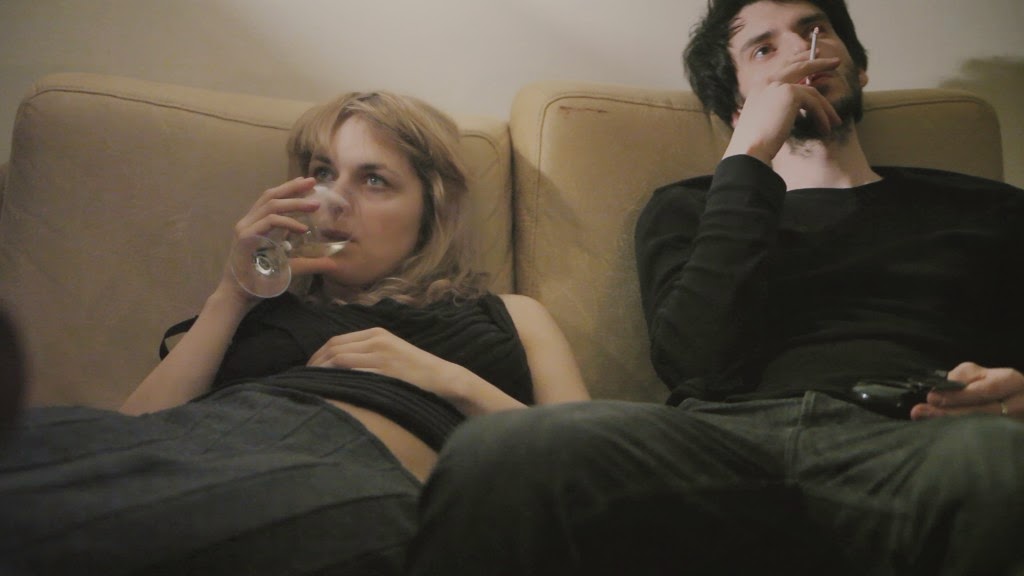The Oscar-nominated documentary short program is an
interesting crop of selections this year. Four of the five nominees are simply
documents of a particular subject, be it place, character, or family. Only one
has what could be construed as having an agenda, or attempting to call
attention to an issue and even that example is a restrained portrait of the
subject matter.
In White Earth,
Christian Jensen goes to a small town in North Dakota where the population has
swollen due to recent oil drilling. People are showing up from all over the
country hoping for a better life for their families through more work. Rather
than focus on the nefariousness of oil companies, or the blight on the land
that the drills cause, Jensen talks to the children of oil workers about how
they feel about the work, their town, and their future. It’s only twenty
minutes, so it doesn’t go deep. The film presents a snapshot of a town and some
of its people. The images are occasionally beautiful, scattered though they are
throughout. The result is a simple document of family life, parenting, and the
desire to see your children have a better life.
Family is a big part of two documentaries centered on
illness. In Our Curse, a Polish
couple grapple with the challenges of having an infant son with Ondine’s Curse,
a congenital affliction that requires a lifetime breathing apparatus during
sleep. In Joanna (also in Poland) a
young mother with cancer cares for her son Janek, a cute and precocious
six-year old who has a very special bond with his mom. Both films are made in
the style of a video diary. Tomasz Slivinski, the father, is the filmmaker in Our Curse. His camera captures the everyday
drudgery of caring for a sick child as well as late-night conversations between
him and his wife where they casually and affectlessly confess their fears.
Joanna feels
like it could be a fiction film. There are no on screen dates or info titles to
tell us what’s happening or reveal crucial details. The filmmaker Aneta Kopacz
catches Joanna and Janek (and sometimes her husband) in intimate moments both
outdoors and at home. The narrative gradually reveals the strong relationship
and overwhelming love between Joanna and her son so that the impact when they
tell Janek that his mother will die (shot silently from outside the house
looking in) is great. Neither film has talking head interviews and neither one
advocates for the diseases afflicting these families. They are truly and purely
films about the bonds and love of family, beautifully rendered.
The most haunting entry is The Reaper (La parka in
its original Spanish) by Gabriel Serra about a man in Mexico who works in a slaughterhouse. The
film’s title is his nickname at work, earned because of the number of bulls he
kills on a daily basis. Again, there’s no agenda here in terms of the cruelty
of animal slaughter or the deleterious effects on the human mind. The style
reminded me a lot of the documentary Leviathan
with its heavy reliance on abstract, almost avant garde compositions that
capture partial images. As we peer in at the bull before he’s pulverized, the
camera shows only part of his face. At other times the camera sits idly on the
side almost as if someone left it accidentally recording and we get the sound
effects and ambient noise of the facility without seeing much detail. The effect
is to turn the slaughterhouse into a place where human feeling has no place,
where people go to do a job without consideration for what they do.
The most affecting of the five nominees and the one I
think is most likely to win is Crisis
Hotline: Veterans Press 1. At a veterans hospital in upstate New York, a small
call center handles all the phone calls made by war veterans seeking help with
PTSD, violent and suicidal tendencies, or some combination of all. The film
doesn’t deal directly with any veterans. In fact, we never see any of the
callers. The subject here is the team working the phones in the call center.
Some are veterans themselves, all are trained in mental health, and all are on
the front lines of an entirely different battle that we don’t talk enough about
in this country. Namely, the cost of war on the young men and women who go
oversees to kill, to be killed, and to watch their friends die. Ellen
Goosenberg Kent shows us one side of some harrowing phone calls, some of which
last an hour or more and most of which have high stakes of life and death.
After each call, the responder has a conversation with a supervisor to talk it
through. The implication of this work is that these responders can wind up
despondent and in need of help themselves. Of the five nominees, this is the one
that calls attention to a problem, but it’s dignified. It’s no a call to
action, but a brief portrait of some of the most empathetic and caring
individuals the American military will have the privilege to talk to if they
need to.








No comments:
Post a Comment